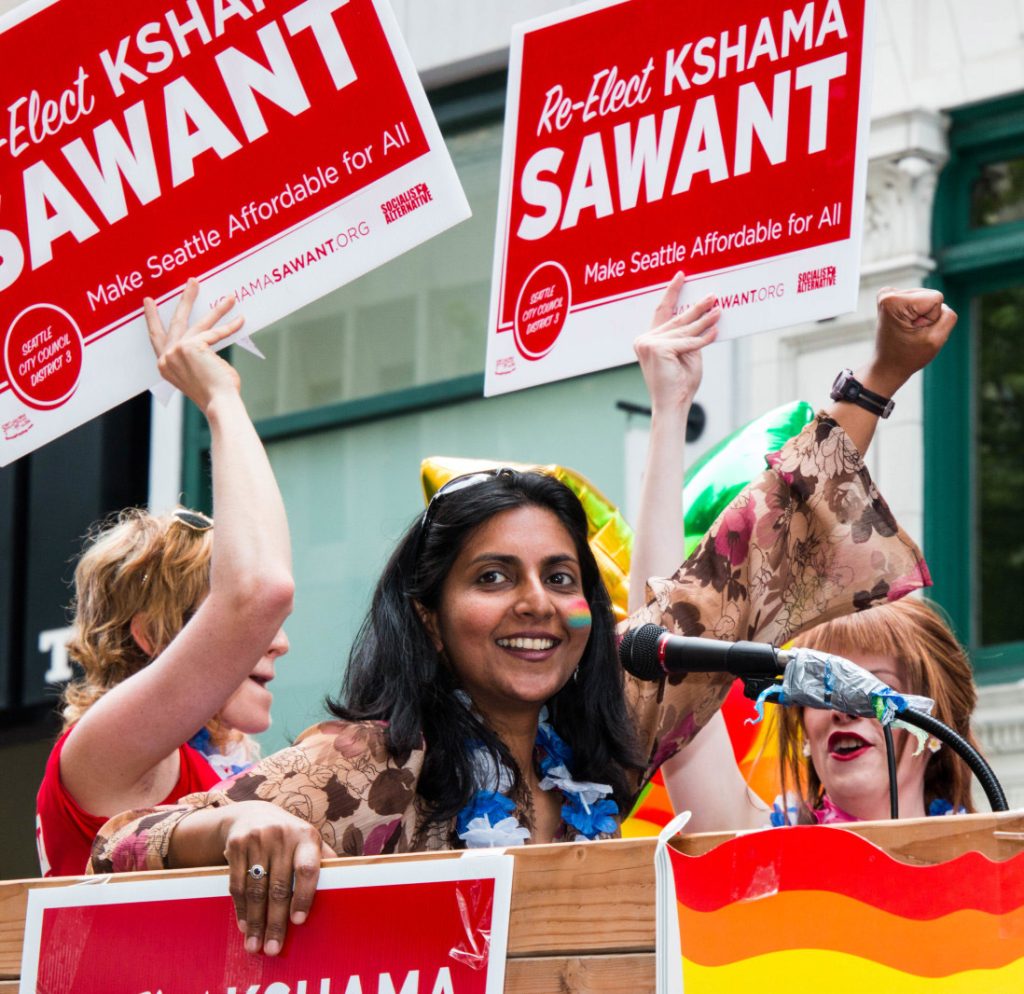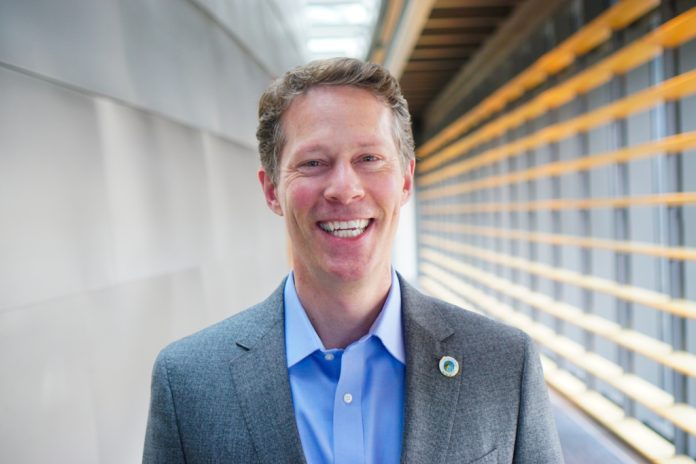Yesterday, the Seattle City Council dug into the latest budget projections and found the City is expected to be short between $210 million to $300 million. While some councilmembers are exploring revenue options to plug that budget hole, Councilmember Alex Pedersen is busy calling for austerity and trying to roast his colleague Councilmember Kshama Sawant–seemingly for sport–for proposing a large new tax on big business.
Pedersen laid out his stridently conservative positions in an op-ed co-written with real estate economist Matthew Gardner, who published a similar screed against the 2018 head tax on behalf of his employer: Windermere Real Estate. That op-ed was published in The Seattle Times–the paper whose endorsement helped propel Pedersen to victory in 2019 election over socialist Shaun Scott. Scott, by the way, campaigned on taxing the rich to fund an expansion of social housing and social programs. Trickle down economics appears to be Pedersen’s recipe to recover from the staggering recession.
“It’s a basic economic principle that governments cannot tax their way out of recessions,” Pedersen and Gardner opined–seemingly writing off the government-led Keynesian response to the Great Depression as if it was a fever dream rather than one of those most salient chapters in economic history right now–“especially if the key to revitalizing the local economy is to encourage employers to rehire workers.” This is more a tenet of the Republican Party that a proven economic principle. Taxing the rich alone may not cure a recession, but the revenue gained from doing so certainly can. After all, the government is the only entity that can counter-cyclically spend during a recession at scale to fuel the economy and fend off a deeper economic downturn.
That was the first reason in Pedersen’s click-bait style “10 reasons to say no to the job-killing Sawant tax” article. They don’t get any better. The authors move on to a red herring in reason two, in which they draw attention to a smaller countywide payroll tax that stalled out in the Washington State Legislature before it adjourned for the rest of the year–not exactly leaving it as a rapid response option.
“It’s the ‘Bellevue Relocation Act’,” they sneer. “Thanks to the heroic work of state Rep. Nicole Macri, D-Seattle, Olympia nearly passed a smart bill to raise revenue from local businesses. It was smart because regional problems require regional solutions.”
Too bad “close” only counts in horseshoes, not in legislating. It’s also a neat trick where conservative leaders praise a progressive proposal but only from a safe distance after session is over. Where were Pedersen, Gardner, and Windermere Real Estate when Nicole Macri was desperately trying to whip votes for her bill? Apparently they didn’t have op-ed writing time back then. The regional problem, regional solution line has also turned into a mantra for inaction and delay since King County and other regional bodies have proven slow to respond to emerging crises at sufficient scale. Seeing no regional leadership, is Seattle supposed to sit on his hands just to prove an academic point?
In reason three, the authors claim that the “Amazon Tax” is a misleading name since about 800 businesses would be taxed, starting out like a plausible critique. They overplay their hand, though, as they gloat about the repeal of the head tax. “For-profit employers with annual payrolls exceeding $7 million would be subject to this new Seattle tax that would collect an estimated $500 million a year–this is 10 times more than the ‘Head Tax’ which was canceled during healthier economic times only two years ago.” Gardner and Pedersen both opposed the head tax, showing that it wasn’t the recession that motivated their opposition to corporate taxes since the economy was then booming. They–like Republican leaders–just oppose taxes all the time–boom or bust.
Reason four is a grab bag of concern trolling about unintended consequences. Will the tax hurt corporate charitable giving? Will it hit for-profit clinics? And finally the concern trolling coup d’grace: “Will Councilmember Sawant’s proposal to provide one-time cash payments disqualify some low-income families from accessing state or federal social-service programs that have strict income limits?” We might help them too much to qualify for other help is an impressively convoluted complaint.
Ironically, reason five calls out themselves. If Sawant “uses COVID-19 as cover” to advance a tax she’s pushed for years, they’re using COVID-19 as cover to continue to oppose business taxes they’ve opposed for years. Quoting the authors themselves, “it seems disingenuous to link it to the pandemic.” While the authors argue “the Sawant Tax is misleadingly labeled as an ’emergency’ when, in fact, her tax would never end,” so too is their “emergency” opposition to business taxes. Just admit you don’t like business taxes all the time. Don’t pretend like a pandemic caused this newfound conservatism.
Reason six straight up claims the federal and state relief packages are already sufficient, which is easy coming from two wealthy homeowners. I’d encourage them to live the life of low-wage service worker–the people trying to safe healthy and make rent while delivering our food, cleaning our public spaces, and attending to the sick and dying with limited protective gear–for a week or two and see if they still think America’s working class has their needs met and has been sufficiently bailed out.
Reason seven is that interfund loans are risky. The proposal borrows from City department budgets to make money more immediately available for low-income payments. This starts out as a fair point, but one borne out of the reality of a payroll excise tax not being implementable immediately. And it devolves into a libertarian talking point at the end: “even though the tax could ultimately be overturned by the courts.” Pedersen cited this same reason for opposing something as benign as electronic design review. Can you imagine Alex Pedersen voting on the Civil Rights Act or the Fair Housing Act? Would he say, “ah shucks there’s some good ideas here but lawsuits give me heartburn”? When it comes to social change, risk nothing and you will gain nothing.
Reason eight is also straight out of the Republican playbook. “It wastes money,” they claim–as if 3% administrative overhead is a scandal. $100 million over five years sounds like a lot until you realize the tax would bring in billions. It’s reminiscent of how conservatives have underfunded the IRS in order to make it easy for rich people to cheat on their taxes–thereby costing the country way more money than they save. Fiscal conservatism at work!
Reason nine is a call for the Seattle City Council to wait for the cavalry–a cavalry that hasn’t come for as long as anyone remembers. “State legislators can do more,” which is the understatement of the century, but also not likely to materialize into any major help any time soon since state government is grappling with its own budget implosion and not likely to be doling out local assistance. COVID-19 has probably made the case for progressive tax reform stronger, but can we count on the Washington State Legislature to promptly see it through after so many years of inaction?
As you’ve probably noticed, the first nine reasons criticize but do not really offer actionable solutions. Reason 10 pretends to do that, but don’t be fooled. It’s a pretty unworkable recipe that comes up short. The only specific cuts they offer are freezing government salaries and killing (again) the resurrected Center City Connector streetcar project, which would save only a small amount of money since many of the costs are sunk or coming from outside sources.
“There’s a fiscally responsible way to close our city’s deficit,” the snakeoil salesmen begin their pitch. “City Hall faces a shortfall currently estimated at about $200 million for its $6.5 billion budget (including its $1.5 billion General Fund). To close the gap, City Hall can tap into its two emergency funds of $120 million, trim at least 10% of its General Fund (in part by removing pay raises for the highest-paid government workers) and deploy relief funds from the federal government, which include clean-energy programs to improve our environment. To accelerate vital infrastructure projects like the West Seattle Bridge, we can redirect funds away from money-losing projects like the Center City Connector streetcar through downtown.”
A 10% cut to the General Fund would be devastating. Invariably, the austerity meat cleaver will hit social services that people count on–especially during a pandemic recession double whammy. Being surgical with a 10% cut simply isn’t feasible. And Pedersen has been a loud proponent of increasing funding, enrollment, and salaries for police and firefighters, which suggests the self-styled austerity guru may already have some big sacred cows.
When Alex Pedersen calls for decreasing police budgets, we will know he’s serious about his plan. Until then, it’s just gratuitous political point scoring against Councilmember Sawant, a perennial punching bag for conservatives and moderates. Picking on Sawant and making her the face of the City Council and the progressive movement was a campaign strategy deployed in the 2019 election. It didn’t always work, but it served as a nice distraction. Unfortunately, that still appears to be the formula long after campaign season is over. And The Seattle Times, much like the campaign mailers most Seattlites received last year, pointedly use a photo of Sawant with her mouth open as if yelling in rage–suggesting intent to play on racial biases against powerful women of color.

Pillorying Sawant isn’t a plan. And by the way, Councilmember Tammy Morales, who goes completely unmentioned in Pedersen’s op-ed, also signed on to the “Tax Amazon” bill. Morales won her seat with more than 60% of the vote running on taxing big business. We need councilmembers to come together around a plan, and I don’t think a 10% cut to the general fund is going to be that rallying point.
The “Tax Amazon” plan may end up struggling to secure the votes it needs, especially if it needs a veto-proof majority if Mayor Jenny Durkan treats it like she did the 2018 head tax. However, the progressive wing of the Seattle City Council should certainly come together around taxing big businesses and the rich rather than austerity cuts.
And if his colleagues comes forward with a consensus big business tax proposal to plug the budget hole and provide some COVID-19 relief, will Pedersen change his tune or continue to belt out the conservative chorus of ‘Cut everything!* Austerity here we come!’
*Except for cops.
The featured image is courtesy of the Pedersen campaign.
Doug Trumm is publisher of The Urbanist. An Urbanist writer since 2015, he dreams of pedestrian streets, bus lanes, and a mass-timber building spree to end our housing crisis. He graduated from the Evans School of Public Policy and Governance at the University of Washington in 2019. He lives in Seattle's Fremont neighborhood and loves to explore the city by foot and by bike.



